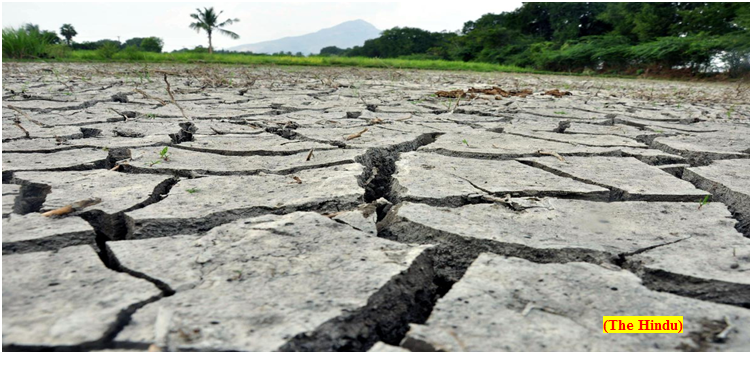Poor soil management will erode food security (GS Paper 3, Environment)

Context:
- World Soil Day (WSD) 2022, annually observed on December 5.
- WSD 2022, with its guiding theme, ‘Soils: Where food begins’, is a means to raise awareness on the importance of maintaining healthy soils, ecosystems and human well-being by addressing the growing challenges in soil management, encouraging societies to improve soil health, and advocating the sustainable management of soil.
Why it matters?
- Healthy soils are essential for survival. They support healthy plant growth to enhance both nutrition and water percolation to maintain groundwater levels.
- Soils help to regulate the planet’s climate by storing carbon and are the second largest carbon sink after the oceans.
- They help maintain a landscape that is more resilient to the impacts of droughts and floods. As soil is the basis of food systems, it is no surprise that soil health is critical for healthy food production.
Degradation and its consequences:
- Today, nutrient loss and pollution significantly threaten soils, and thereby undermine nutrition and food security globally. The main drivers contributing to soildegradation are industrial activities, mining, waste treatment, agriculture, fossil fuel extraction and processing and transport emissions.
- The reasons behind soil nutrient loss range from soil erosion, runoff, leaching and the burning of crop residues.
- Soil degradation in some form or another affects around 29% of India’s total land area. This in turn threatens agricultural productivity, in-situ biodiversity conservation, water quality and the socio-economic well-being of land dependent communities.
- Nearly 3.7 million hectares suffer from nutrient loss in soil (depletion of soil organic matter, or SOM). Further, excessive use of fertilizers and pesticides, and irrigation with contaminated wastewater are also polluting soils.
- Impacts of soil degradation are far reaching and can have irreparable consequences on human and ecosystem health.
India’s conservation strategy:
- The Government of India is implementing a five-pronged strategy for soil conservation. This includes making soil chemical-free,
- saving soil biodiversity,
- enhancing SOM,
- maintaining soil moisture, mitigating soil degradation and
- preventing soil erosion.
Soil Health Card (SHC):
- Earlier, farmers lacked information relating to soil type, soil deficiency and soil moisture content. To address these issues, the Government of India launched the Soil Health Card (SHC) scheme in 2015.
- The SHC is used to assess the current status of soil health, and when used over time, to determine changes in soil health. The SHC displays soil health indicators and associated descriptive terms, which guide farmers to make necessary soil amendments.
Other initiatives:
- Other pertinent initiatives include the Pradhan Mantri Krishi Sinchayee Yojana, to prevent soil erosion, regeneration of natural vegetation, rainwater harvesting and recharging of the groundwater table.
- In addition, the National Mission for Sustainable Agriculture (NMSA) has schemes promoting traditional indigenous practices such as organic farming and natural farming, thereby reducing dependency on chemicals and other agri-inputs, and decreasing the monetary burden on smallholder farmers.
Collaboration with FAO:
- The Food and Agriculture Organization of the United Nations (FAO) undertakes multiple activities to support the Government of India’s efforts in soil conservation towards fostering sustainable agrifood systems.
- The FAO is collaborating with the National Rainfed Area Authority and the Ministry of Agriculture and Farmers’ Welfare (MoA&FW) to develop forecasting tools using data analytics that will aid vulnerable farmers in making informed decisions on crop choices, particularly in rainfed areas.
Working with target States:
- The FAO, in association with the Ministry of Rural Development, supports the DeenDayalAntyodaya Yojana-National Rural Livelihoods Mission’s (DAY-NRLM) Community Resource Persons to increase their capacities towards supporting on-farm livelihoods for the adoption of sustainable and resilient practices, organic certification and agri-nutri-gardens.
- The FAO works in eight target States, namely, Madhya Pradesh, Mizoram, Odisha, Rajasthan, Uttarakhand, Chhattisgarh, Haryana and Punjab, for boosting crop diversification and landscape-level planning.
- In Andhra Pradesh, the FAO is partnering with the State government and the Indian Council of Agricultural Research (ICAR) to support farmers in sustainable transitions to agro-ecological approaches and organic farming.
Way Forward:
- There is a need to strengthen communication channels between academia, policymakers and society for the identification, management and restoration of degraded soils, as well as in the adoption of anticipatory measures.
- These will facilitate the dissemination of timely and evidence-based information to all relevant stakeholders.
- Greater cooperation and partnerships are central to ensure the availability of knowledge, sharing of successful practices, and universal access to clean and sustainable technologies, leaving no one behind.
- As consumers and citizens, we can contribute by planting trees to protect topsoil, developing and maintaining home/kitchen gardens, and consuming foods that are mainly locally sourced and seasonal.


